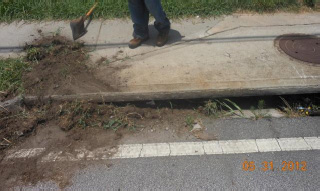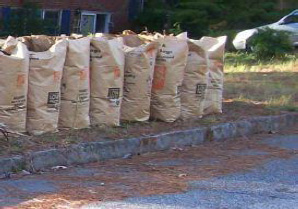
The largest source of storm water pollution in Clarkston is runoff from developed property. Everyone, in one way or another, is likely to be part of the problem, but everyone can also be part of the solution. If you own a car, maintain it so it does not leak oil or other fluids. Be sure to wash it on the grass or at a car wash so the dirt and soap do not flow down the driveway and into the nearest storm drain. If you have a yard, do not over fertilize your grass. Never apply fertilizers or pesticides before a heavy rain. If fertilizer falls onto driveways or sidewalks, sweep it up instead of hosing it away. Mulch leaves and grass clippings and place leaves in the yard at the curb, not in the street.
Doing this keeps leaves out of the gutter, where they can wash into the nearest storm drain. Turn your gutter downspouts away from hard surfaces, seed bare spots in your yard to avoid  erosion and consider building a rain garden in low-lying areas of your lawn. If you have a septic system, maintain it properly by having it pumped every three to five years. If it is an older system, be sure it can still handle the volume placed on it today. Never put chemicals down septic systems, they can harm the system and seep into the groundwater. Pet owners should pick up after their pets and dispose of pet waste in the garbage. Keep lawn and household chemicals tightly sealed and in a place where rain cannot reach them. Dispose of old or unwanted chemicals at household hazardous waste collections sites or events. Never put anything in a storm drain and don’t litter.
erosion and consider building a rain garden in low-lying areas of your lawn. If you have a septic system, maintain it properly by having it pumped every three to five years. If it is an older system, be sure it can still handle the volume placed on it today. Never put chemicals down septic systems, they can harm the system and seep into the groundwater. Pet owners should pick up after their pets and dispose of pet waste in the garbage. Keep lawn and household chemicals tightly sealed and in a place where rain cannot reach them. Dispose of old or unwanted chemicals at household hazardous waste collections sites or events. Never put anything in a storm drain and don’t litter.
By keeping your yards free from the accumulation of leaves and debris will have a positive impact on the storm water system. The best method for eliminating debris and leaves is to bag your leaves for pick up.
When doing yard work, please do not set piles of leaves or limbs near to or on top of a storm water drain.